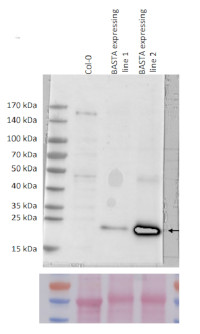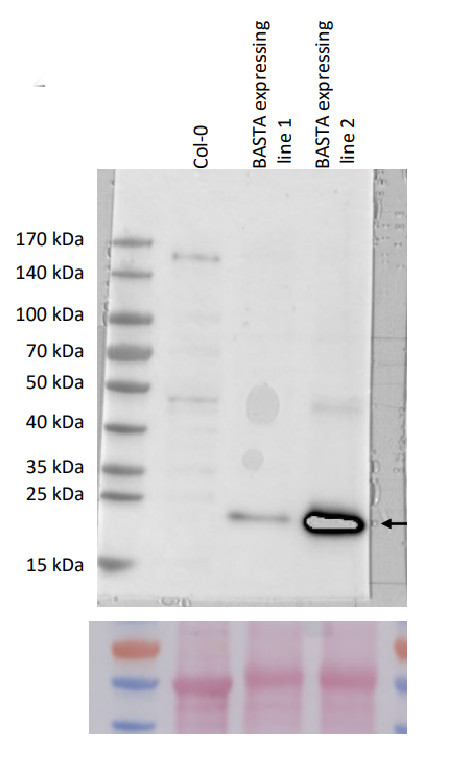1

Anti-BAR | Phosphinothricin N-acetyltransferase (170-183)
AS21 4612 | Clonality: Polyclonal | Host: Rabbit | Reactivity: BAR (BASTA) epitope tag (170-183)
- Product Info
-
Immunogen: KLH-conjugated peptide derived from position 170-183 of Phosphinothricin N-acetyltransferase (BAR or BASTA), UniProt: P16426 Host: Rabbit Clonality: Polyclonal
Purity: Antigen affinity purified serum, in PBS pH 7.4 Format: Lyophilized Quantity: 50 µg Reconstitution: For reconstitution add 50 µl, of sterile or deionized water. Storage: Store lyophilized/reconstituted at -20°C; once reconstituted make aliquots to avoid repeated freeze-thaw cycles. Please, remember to spin tubes briefly prior to opening them to avoid any losses that might occur from lyophilized material adhering to the cap or sides of the tubes. Tested applications: Western blot (WB) Recommended dilution: 1 : 1000 - 1: 5000 (WB) Expected | apparent MW: 20.6 kDa
- Reactivity
-
Confirmed reactivity: BAR (BASTA) Predicted reactivity: Streptomyces viridochromogenes
Species of your interest not listed? Contact usNot reactive in: No confirmed exceptions from predicted reactivity are currently known - Application Examples
-

Samples:
From the left:
Arabidopsis thaliana wt - 1
Arabidopsis thaliana overexpressing line 1 with BAR (BASTA) - 2
Arabidopsis thaliana overexpressing line 1 with BAR (BASTA) - 3
20 µg/well of total protein extracted freshly from Arabidopsis thaliana leaves with extraction buffer: 50 mM Tris/Cl pH 7,5 , 150 mM NaCl , 1% Nonidet P40 , 1 tablet Proteinase inhibitor cocktail/ 10 ml. and denatured with SDS sample buffer 95°C at °C were separated on 4-15% % SDS-PAGE and blotted 1h to nitrocellulose (pore size of 0,45 µm), using wet transfer. Blot was blocked with 5 % milk for 1h/RT with agitation. Blot was incubated in the primary antibody at a dilution of 1: 1 000 for ON/4°C with agitation. The antibody solution was decanted, and the blot was rinsed briefly twice, then washed once for 15 min and 3 times for 5 min in TBS-T at RT with agitation. Blot was incubated in Agrisera matching secondary antibody (anti-rabbit IgG horse radish peroxidase conjugated AS09 602) diluted to 1:25 000 in for 1h/RT with agitation. The blot was washed as above and developed for 5 min. with Agrisera ECLBright (AS16 ECL-N-10). Exposure time was seconds.
Courtesy of Dr. Dr. Birgit Kemmerling, ZMBP - Center for Plant Molecular Biology, Plant Biochemistry University of Tuebingen, Germany
- Additional Information
-
Additional information (application): BAR (BASTA) gene is a selectable marker of plant genetic transformation, Nada (2016). Novel recombinant binary vectors harboring Basta (bar) gene as a plant selectable marker for genetic transformation of plants. Physiol Mol Biol Plants. 2016 Apr; 22(2): 241–251. - Background
-
Background: Phosphinothricin N-acetyltransferase (BAR) is an enzyme is an effector of phosphinothricin tripeptide (PTT or bialaphos) resistance, herbicide resitance gene. BAR (BASTA) gene is used as a selectable marker for genetic transformation of plants.
Alternative names: PPT N-acetyltransferase, Phosphinothricin-resistance protein. - Protocols
-
Agrisera Western Blot protocol and video tutorials
Protocols to work with plant and algal protein extracts
Agrisera Educational Poster Collection - Reviews:
-
This product doesn't have any reviews.
Accessories

AS09 580-HRP | Clonality: Polyclonal | Host: Rabbit | Reactivity: Nicotiana tabacum, Chlamydomonas reinhardtii


